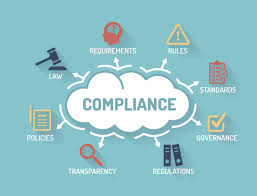Navigating Compliance: A Guide to Ensuring Regulatory Adherence

The Importance of Compliance in Today’s Business Environment
In the ever-evolving landscape of business operations, compliance has emerged as a critical aspect that organizations cannot afford to overlook. Compliance refers to adhering to laws, regulations, and standards set forth by governing bodies relevant to a particular industry or jurisdiction.
Ensuring compliance is not merely a box-ticking exercise; it is a fundamental component of good governance and risk management. Failure to comply with applicable laws and regulations can result in severe consequences, including financial penalties, legal action, reputational damage, and even business closure.
Key Reasons Why Compliance Matters:
- Legal Obligations: Businesses are required to comply with a myriad of laws and regulations at the local, state, national, and international levels. Non-compliance can lead to fines, lawsuits, and sanctions.
- Reputation Management: Maintaining a reputation for ethical conduct and regulatory compliance is crucial for building trust with customers, investors, and other stakeholders.
- Risk Mitigation: Compliance programs help identify and mitigate risks associated with non-compliance, fraud, data breaches, and other potential threats to the business.
- Operational Efficiency: Implementing robust compliance processes can streamline operations, enhance transparency, and improve overall efficiency within an organization.
- Competitive Advantage: Demonstrating a commitment to compliance can set businesses apart from their competitors and attract partners who value ethical business practices.
In conclusion, compliance is not just a regulatory requirement; it is a strategic imperative for organizations seeking long-term success in today’s complex business environment. By prioritizing compliance efforts and integrating them into core business practices, companies can safeguard their reputation, minimize risks, and foster sustainable growth.
6 Essential Tips for Ensuring Corporate Compliance and Integrity
- Regularly review and update compliance policies and procedures.
- Provide regular training to employees on compliance requirements.
- Encourage a culture of ethics and integrity within the organization.
- Establish clear channels for reporting potential compliance issues or violations.
- Conduct periodic audits to assess compliance with regulations and internal policies.
- Stay informed about changes in relevant laws and regulations that may impact your industry.
Regularly review and update compliance policies and procedures.
It is essential for organizations to regularly review and update their compliance policies and procedures to ensure they remain aligned with the latest laws, regulations, and industry best practices. By conducting periodic reviews, businesses can identify gaps or areas for improvement in their compliance framework and take proactive steps to address them. Updating policies and procedures also helps to adapt to evolving risks and changing business environments, ultimately enhancing overall compliance effectiveness and reducing potential vulnerabilities.
Provide regular training to employees on compliance requirements.
To ensure adherence to compliance requirements, it is essential for organizations to provide regular training sessions to employees. By educating staff members on the latest laws, regulations, and internal policies, companies can empower their workforce to make informed decisions and conduct business activities in a compliant manner. Ongoing training not only enhances employees’ understanding of compliance obligations but also reinforces a culture of ethics and integrity within the organization. Investing in employee education demonstrates a commitment to upholding legal standards and mitigating risks associated with non-compliance, ultimately contributing to a more resilient and responsible business environment.
Encourage a culture of ethics and integrity within the organization.
Encouraging a culture of ethics and integrity within the organization is a key tip for ensuring compliance with laws and regulations. By fostering an environment where ethical behavior is valued and integrity is upheld, employees are more likely to make decisions that align with legal requirements and ethical standards. This culture of ethics not only helps in preventing compliance violations but also contributes to building trust with stakeholders and maintaining a positive reputation for the organization in the long run.
Establish clear channels for reporting potential compliance issues or violations.
Establishing clear channels for reporting potential compliance issues or violations is essential for maintaining a culture of transparency and accountability within an organization. By providing employees, stakeholders, and partners with accessible and confidential avenues to raise concerns, companies can proactively identify and address compliance issues before they escalate. These reporting mechanisms not only encourage ethical behavior but also demonstrate a commitment to upholding regulatory standards and best practices. Effective communication of these channels helps foster trust and collaboration, ultimately contributing to a stronger compliance framework that protects the organization’s integrity and reputation.
Conduct periodic audits to assess compliance with regulations and internal policies.
Conducting periodic audits is a crucial tip to ensure compliance with regulations and internal policies. By regularly reviewing and assessing adherence to established standards, organizations can identify potential areas of non-compliance, address any issues promptly, and strengthen their overall compliance framework. These audits provide valuable insights into the effectiveness of existing policies and procedures, helping businesses proactively mitigate risks and maintain a culture of compliance across all levels of the organization.
Stay informed about changes in relevant laws and regulations that may impact your industry.
Staying informed about changes in relevant laws and regulations that may impact your industry is a crucial tip for maintaining compliance. By keeping abreast of updates and developments in the legal landscape, businesses can proactively adjust their practices to ensure adherence to the latest requirements. This proactive approach not only helps mitigate the risk of non-compliance but also demonstrates a commitment to ethical conduct and regulatory responsibility within the industry. Regularly monitoring and understanding changes in laws and regulations can empower organizations to navigate complex compliance challenges effectively and uphold their reputation as responsible corporate citizens.



